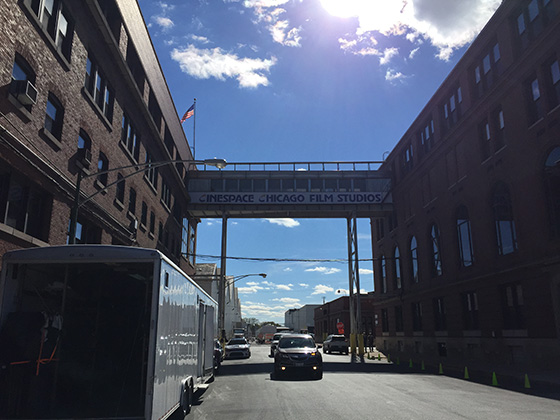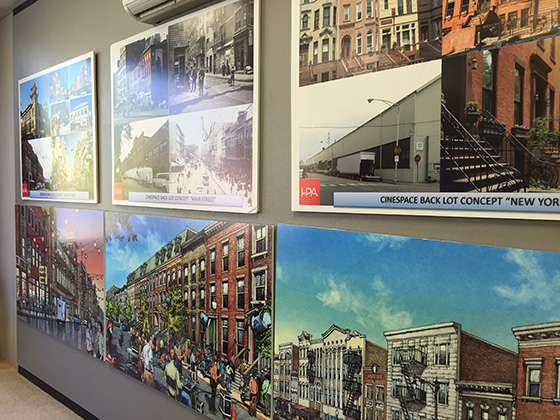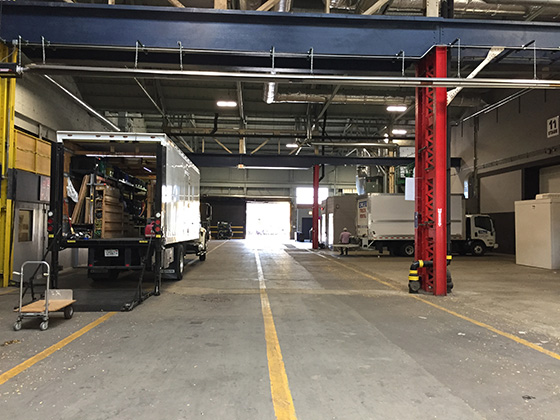| « Steppenwolf's 1984 Recreates Dystopian World of the Past...and the Present | The Mammals' All Girl Dracula is Uneven and Bloodless » |
Film Wed Oct 28 2015
Cinespace & Stage 18: Growing Chicago's Film Industry & North Lawndale's Economy
Mark Dengen leans back in his chair and looks out the row of windows lining his office wall. Outside, on the first chilly day of October, the operations of the largest film studio complex this side of LA hum along. Dengen, Cinespace's CFO, smiles as he looks out at the work being done on NBC series "Chicago Fire" and "Chicago PD" and reflects on how much has changed here over the past decade--not only on the Cinespace campus, but in the North Lawndale community at large.

"This was vacant. Completely vacant," he says. "Saw this completely go south, and then to tumbleweeds, and then from tumbleweeds back to 4,000 people working on this campus."
Just 15 years ago, metal distributor Ryerson owned this row of warehouses in North Lawndale and it bustled with workers. But by the time a private equity firm bought Ryerson in 2006, activity here had dwindled, a symptom of the overall commercial decay that has afflicted this part of the West Side. Dengen was in charge of selling the property, and in Nick Mirkopoulos, who founded the highly successful Cinespace Toronto 30 years ago, he found a visionary buyer.
"There was some family here, Alex [Pissios, CEO of Cinespace Chicago] specifically," Dengen says. "And he was going to help them set up a small commercial stage, but when he saw this property he realized this is a giant studio, it could be a back lot, it's perfect."
Mirkopoulos immediately began developing the campus even before officially acquiring it in 2012, and in the intervening years he, Pissios and the rest of the Cinespace team have built it into a thriving destination for Los Angeles-based filmmakers. Through Mirkopoulos' established Hollywood connections, they were able to lure a number of successful productions here, including Divergent, Dick Wolf's trio of Chicago Fire/PD/Med, and, most notably, the hugely popular New York-set "Empire."
It's helped that many of the producers and filmmakers Cinespace has approached in LA have Chicago roots. Forced to relocate to the coasts because their hometown couldn't provide them with growth opportunities, their ears perked up at the chance to come back. "They were all so excited when they heard that Cinespace was establishing itself in Chicago because they all wanted the opportunity to return," says Dengen.
The national productions have helped Cinespace build some serious filmmaking clout, but basing Chicago's film industry on the whims of coastal producers seeking a change of scenery isn't sustainable, particularly with the impact of tax incentives that vary by state. For instance, the 30 percent tax break for films in Illinois is currently on hold, which Dengen estimates will cost Cinespace around half a dozen pilots and $30 million in missed opportunities this year. With such fierce competition for Hollywood's attention, the most straightforward way for the studio to create a robust Chicago film industry is to ensure that it arises natively. To that effect, Cinespace has placed a strong focus on building not just a strong film community in the city, but also a strong North Lawndale to support its efforts.

The former goal is the domain of Stage 18, the incubator Cinespace created this year to serve as a breeding ground for budding local production companies and other film-related businesses. Stage 18's executive director, Angie Gaffney, a DePaul film program graduate who helped build The Onion Labs and currently runs production company Black Apple Media, highlights a number of factors that need to change for Chicago's nascent film industry to compete with those of LA and New York. First, and most importantly, the quality of local independent projects needs to improve. "The scripts I read on a daily basis for Black Apple Media are 99 percent not anywhere up to par where they need to be for me to consider producing them," she says. "So it's going to take some time to make the projects better and to establish a standard of quality."
Gaffney's hope is that the resources and institutional knowledge Stage 18 provides will help aspiring Chicago filmmakers improve their wares. The incubator's members get access to a shared workspace, key networking opportunities and educational workshops, and the Cinespace studios. Stage 18 also helps its members build projects from script to screen, and a coming partnership with investor group Chicago Media Angels will further bolster the development wing of the organization.
Just being around blockbuster productions like "Empire" and "Chicago Fire" allows members of Stage 18 to absorb some experience. Crucially, though, the incubator acts as a meeting place and think tank for the city's upstart producers, writers and directors to share ideas, collaborate on projects, and push each other to greater heights.
"It's a very cutthroat industry, traditionally in Chicago, since it's never been a mecca for the industry," says Gaffney. "The people that choose to stay here have to be very protective, because there's not a lot of narrative work, you do have to struggle and fight to succeed. And so my hope in Stage 18 is that we can change that mentality a little bit, because I think there's power in collaboration. Instead of people saying 'I have to do this because it's the paycheck I need,' it's 'I can do this because these are the people I have.'"
The end goal is to make Chicago-bred filmmakers feel like they can stay in their hometown, adopted or otherwise. "They can't right now," acknowledges Gaffney. "They can come here to film a show, but they always have to go back to LA." That said, Stage 18 and Cinespace recognize the potential for colleges like DePaul, Columbia and Tribeca Flashpoint to churn out film students who would remain in Chicago if they felt they could. The studio and incubator have partnered with all three schools to create opportunities for hands-on learning experiences and professional grade student productions.
"John Hughes was a Chicago guy, and Harold Ramis was a Chicago guy, but there's other John Hugheses out there, there's other Harold Ramises, and maybe they're just graduating from DePaul or graduating from Columbia," says Dengen. "So keeping them here through the resources that Stage 18 will offer, then they're going to recognize, 'Hey I'm a Chicago guy,' and they'll bring all the productions."
There's a lot of pride associated with the notion of that Chicago connection, particularly in the entertainment realm, where the city has long had a chip on its shoulder. But in fomenting the growth of the Chicago film industry, Cinespace and Stage 18 don't ignore the fact that they've made their home in downtrodden North Lawndale. "There is real struggle in Chicago," says Gaffney. "And for us, as filmmakers, as storytellers, to not capture those struggles, to not have a conversation with them through media, or to better the lives of people through education in the arts, if we're not constantly doing that and giving back to our community in that way as storytellers, then we're failing."

Rather than isolate themselves from the community and perpetuate the cycle of commercial decay, Cinespace and Stage 18 strive to engage local residents in the film industry and see themselves restoring vitality to the area. One way they're accomplishing this is through the CineCares Foundation, established under Mirkopoulos' guidance. "The intention with CineCares is, through fundraising, to create a charitable organization that can fund job training, some anti-violence campaigns, and really help the culture change here as best we can," says Dengen. The foundation has opened doors for adolescents and adults alike to join the ranks of carpenters and teamsters who make film and television productions possible. And this Saturday, it will host a Galaween fundraiser to garner further contributions to its mission.
Eventually, Cinespace hopes to close down the streets that cross its campus and create a fenced-off, Hollywood-style back lot that would not only grant it more industry legitimacy, but also bring in tourism dollars that could help improve North Lawndale. "The objective isn't for us to develop this business to push out any of the people who have raised their families here, it's to improve their standard of living," says Dengen.
The core values of Cinespace and Stage 18's leadership revolve around growth--growth of the Chicago film industry, growth of Chicago's filmmakers, and growth of the studio's community. And if the studio and incubator continue their upward trends, there will be a Hollywood ending in sight for all three.









Rob T / October 28, 2015 3:33 PM
Thank you Gapers Block - Cinespace and Stage 18 are changing the face of TV and Film in Chicago thus creating much needed Jobs for many!